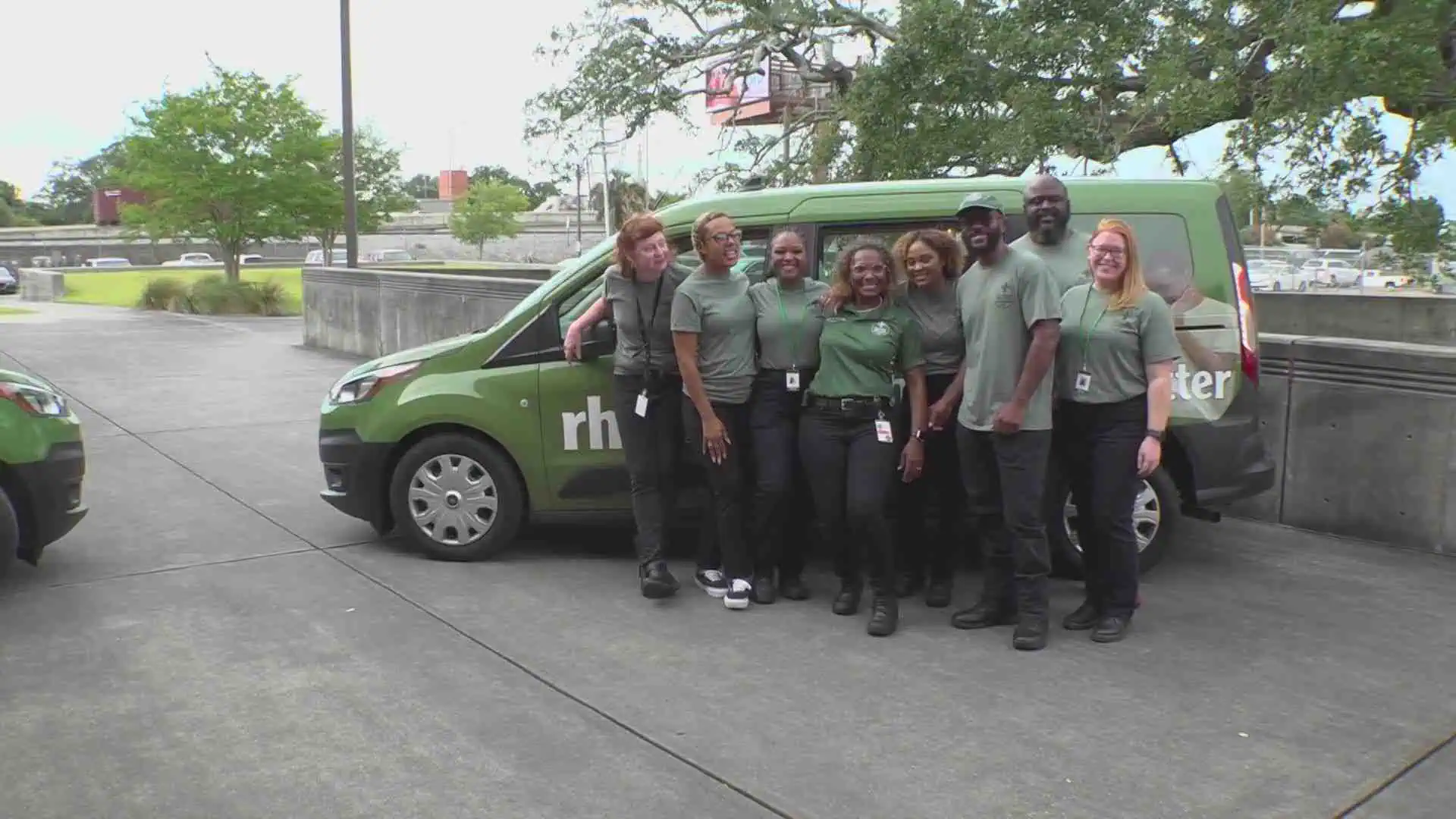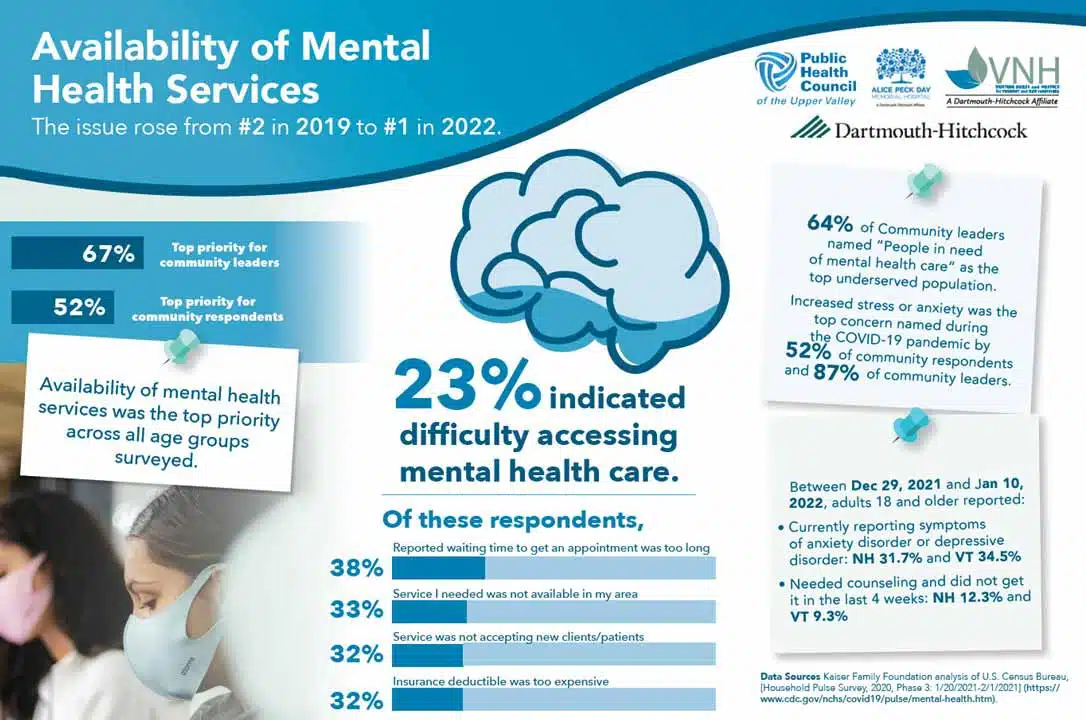
Why Mental Health Services Matter Now More Than Ever
Mental health services are professional supports for managing emotional distress, mental illness, and life challenges, ranging from crisis helplines to inpatient treatment.
Quick Answer: How to Find Mental Health Services
- Emergency: Call 911 or text 988 for immediate crisis support.
- 24/7 Helplines: Contact confidential support lines for guidance.
- Local Resources: Check community health centers and public agencies.
- Online Tools: Use treatment locators and virtual counseling.
- Specialized Care: Seek services for your age, culture, or specific needs.
- Professional Match: Find psychiatrists, psychologists, or therapists.
- Intensive Options: Consider inpatient programs for severe symptoms.
Mental health is as vital as physical health, yet the need for accessible support has never been greater. Many adults and young people face stress, anxiety, or depression that makes daily life feel impossible. Signs it’s time to reach out include changes in mood, sleep, or energy, or for youth, withdrawing from friends and activities.
Navigating the system can be overwhelming due to wait times, costs, and the search for culturally appropriate care. This guide breaks down seven proven ways to find mental health services that fit your needs.
At Addiction Helpline America, we connect people to effective mental health services and addiction treatment nationwide. We understand how hard it is to ask for help and are here to guide you.
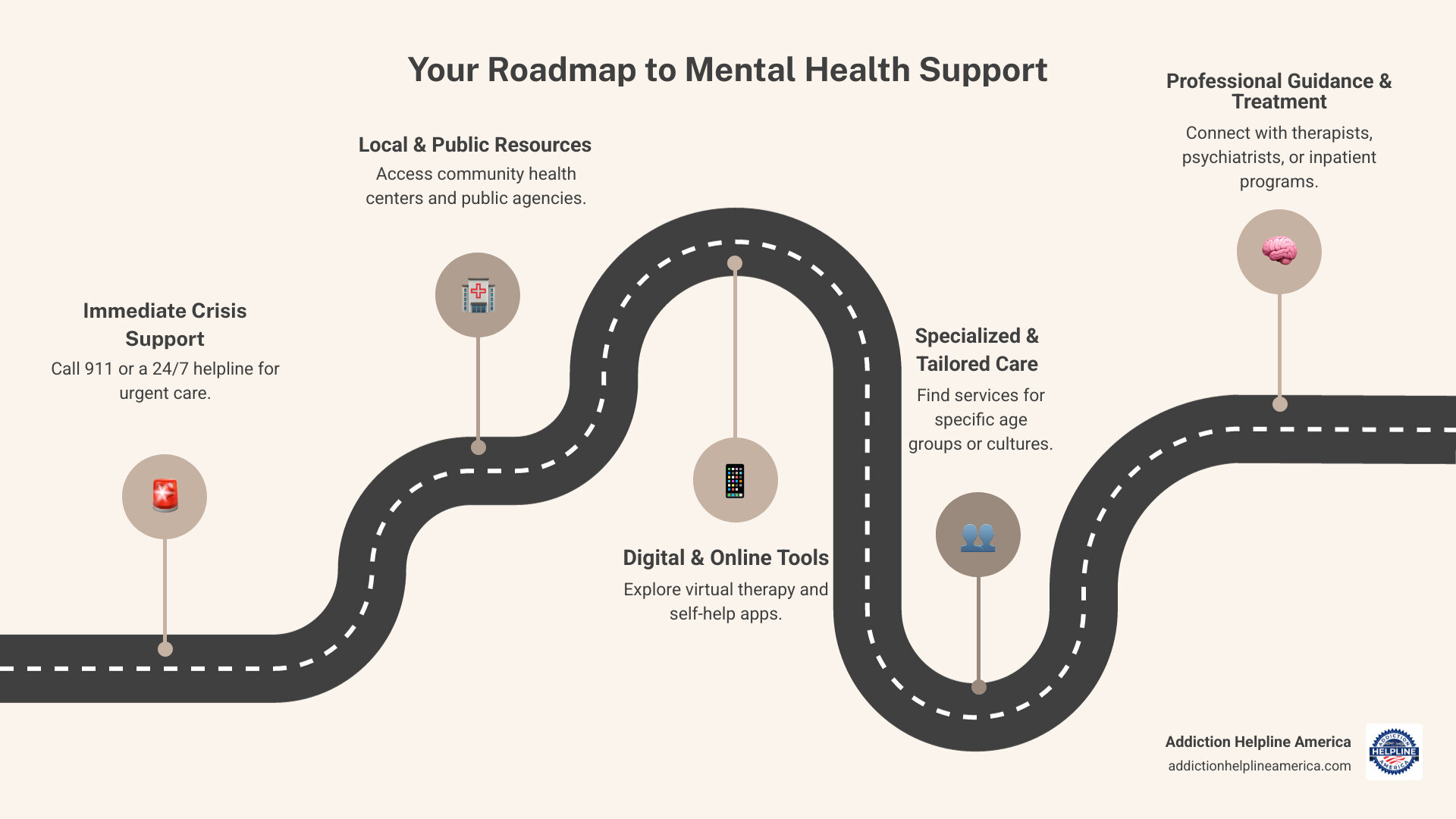
Mental health services terms to know:
Way 1: Start with Immediate and Emergency Helplines
When a mental health crisis hits, you need help right now.
If you or someone else is in immediate danger, call 911 or go to the nearest emergency room. This includes threats of suicide, severe panic or psychosis, or risk of harm to self or others. Emergency responders are trained to handle these critical moments.
For urgent, confidential support, the 988 Suicide & Crisis Lifeline is available 24/7. You can call or text 988 for free to speak with a trained crisis counselor. They offer compassionate, non-judgmental support for suicidal thoughts or other crises.
Several other helplines provide crucial mental health services:
- The SAMHSA National Helpline at 1-800-662-HELP (4357) offers 24/7 confidential referrals for mental health and substance use treatment.
- The Disaster Distress Helpline at 1-800-985-5990 provides crisis counseling for those affected by traumatic events.
- Dialing 211 connects you to a broad network of local community services, including mental health support.
At Addiction Helpline America, our 24 Hour Mental Health Helpline provides personalized guidance to connect you with treatment programs that fit your needs. You can also reach out through our Contact page.
Many of these services offer text and chat options if you’re more comfortable typing than talking. Reaching out during a crisis is an act of courage that can save a life.
Way 2: Steer Public Health and Local Resources
Affordable or free mental health services are often available through public health departments and local resources.
Publicly Available Care: Every state has a publicly funded mental health system to help people access care, regardless of income or insurance. These state departments, such as CalHOPE in California or Connecticut’s Department of Mental Health and Addiction Services, offer a range of support programs.
Local Health Departments: Your county or city health department is a great source of information. They often provide direct services like counseling or can refer you to community mental health centers and sliding-scale clinics. For help finding local options, check our Find Mental Health Support Near You page.
Primary Care Provider Referrals: Your family doctor can screen for mental health conditions, prescribe some medications, and refer you to specialists like psychiatrists or therapists. Don’t hesitate to bring up mental health concerns during your regular appointments.
Call Now – Your Journey to Recovery Begins Today!

Take the first step towards a healthier life! Call now to connect with our compassionate team and start your recovery journey today. Your path to healing awaits!
Our recovery specialists are available 24/7 to provide support, and all calls are confidential and free. Reach out anytime – we’re here to help!
Navigating the System: To simplify your search, use online tools like SAMHSA’s FindTreatment.gov. This free, confidential resource lets you search for treatment facilities across the U.S. and filter by location, service type, payment options, and more.
Potential Challenges: Be prepared for potential challenges like long wait times for low-cost services and the difficulty of finding the right provider. Stigma can also make it hard to ask for help. However, persistence is key—you deserve support, and these resources are there to help you find it.

Way 3: Connect with Community and Non-Profit Organizations
Community and non-profit organizations are often the most accessible source for mental health services. These mission-driven groups focus on improving community well-being, offering support that recognizes the connection between mental health and factors like housing and employment.
Services are often comprehensive and low-cost or free. They typically include:
- Counselling and therapy for individuals, groups, and families.
- Support groups to connect with others facing similar challenges.
- Practical assistance with housing, employment, and life skills through educational workshops.
- Crisis intervention services or warm lines for non-emergency support.
Reputable organizations often seek accreditation, demonstrating a commitment to high standards and patient safety. These services are proven to help clients deal more effectively with life’s challenges.
You can also be part of the solution by volunteering your time or making donations to help these vital programs continue. Getting involved not only helps others but can also boost your own mental well-being and promote Mental Health Awareness.
To find organizations in your area, visit our Find Mental Health Support Near You page.
Way 4: Seek Out Specialized Mental Health Services
Effective mental health services understand you—your background, age, and life experiences. Specialized support is not a luxury; it’s essential for genuine healing.
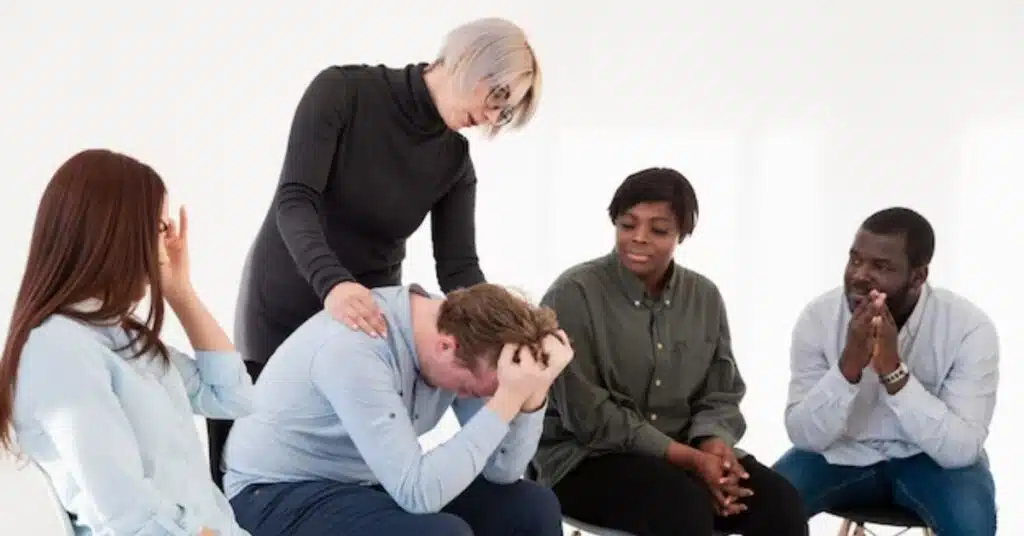
Support for Children and Youth
Young people need age-appropriate care. School-based resources like counselors and psychologists are often the first line of defense. Most colleges and universities also offer dedicated counseling centers for students. Look for signs of distress like prolonged sadness, social withdrawal, or changes in sleep or grades. Early intervention is critical for long-term wellness. Find more guidance on our Youth Mental Health Resources page.
Culturally-Specific Mental Health Services
Culturally competent care respects your traditions and community challenges. This is vital for many groups:
- Indigenous communities benefit from care that integrates traditional healing and addresses historical trauma.
- Newcomers and refugees require support that understands the stress of immigration and language barriers.
- Black communities are increasingly served by providers using anti-racism frameworks to address racial trauma.
- Asian communities can find ethno-cultural agencies offering services in various languages with an understanding of cultural nuances.
Learn more at our Culturally Competent Care resources page.
Resources for Other Populations
- Veterans can find specialized support for combat exposure and reintegration challenges through the Veterans Crisis Line (Call 1-800-273-8255, press 1) and our Supports for Veterans and their families page.
- 2SLGBTQ+ individuals need affirming, inclusive care from providers who understand the mental health impacts of discrimination.
- Workplace mental health programs, like Employee Assistance Programs (EAPs), offer free, confidential counseling.
- Caregivers can find dedicated support for the unique stress of their role through our Caregiver Helpline.
Addiction Helpline America can connect you to specialized mental health services that see all of who you are.
Call Now – Your Journey to Recovery Begins Today!

Take the first step towards a healthier life! Call now to connect with our compassionate team and start your recovery journey today. Your path to healing awaits!
Our recovery specialists are available 24/7 to provide support, and all calls are confidential and free. Reach out anytime – we’re here to help!
Way 5: Explore Digital, Online, and App-Based Tools
The internet has revolutionized access to mental health services, putting professional help at your fingertips.
Virtual therapy and online counseling offer the same quality support as in-person sessions via video, phone, or chat. This is an excellent option if you live in a rural area, have mobility issues, or prefer the comfort of home. SAMHSA’s FindTreatment.gov can filter for providers offering telemedicine.
Self-help programs, often based on Cognitive Behavioral Therapy (CBT), teach practical skills to manage anxiety and depression at your own pace. Our Mental Health Toolkit links to quality CBT resources.
For help navigating these options, Addiction Helpline America offers Addiction Helpline America Online Support to find virtual resources matching your needs.
Mental health apps are great tools for daily wellness. Popular options include MindShift CBT for anxiety, MoodTools for depression, Calm and Headspace for meditation, and PTSD Coach for trauma symptoms. These tools offer flexibility to support your mental health anytime, anywhere.
For a full list of digital tools, visit our Wellness Resources page.
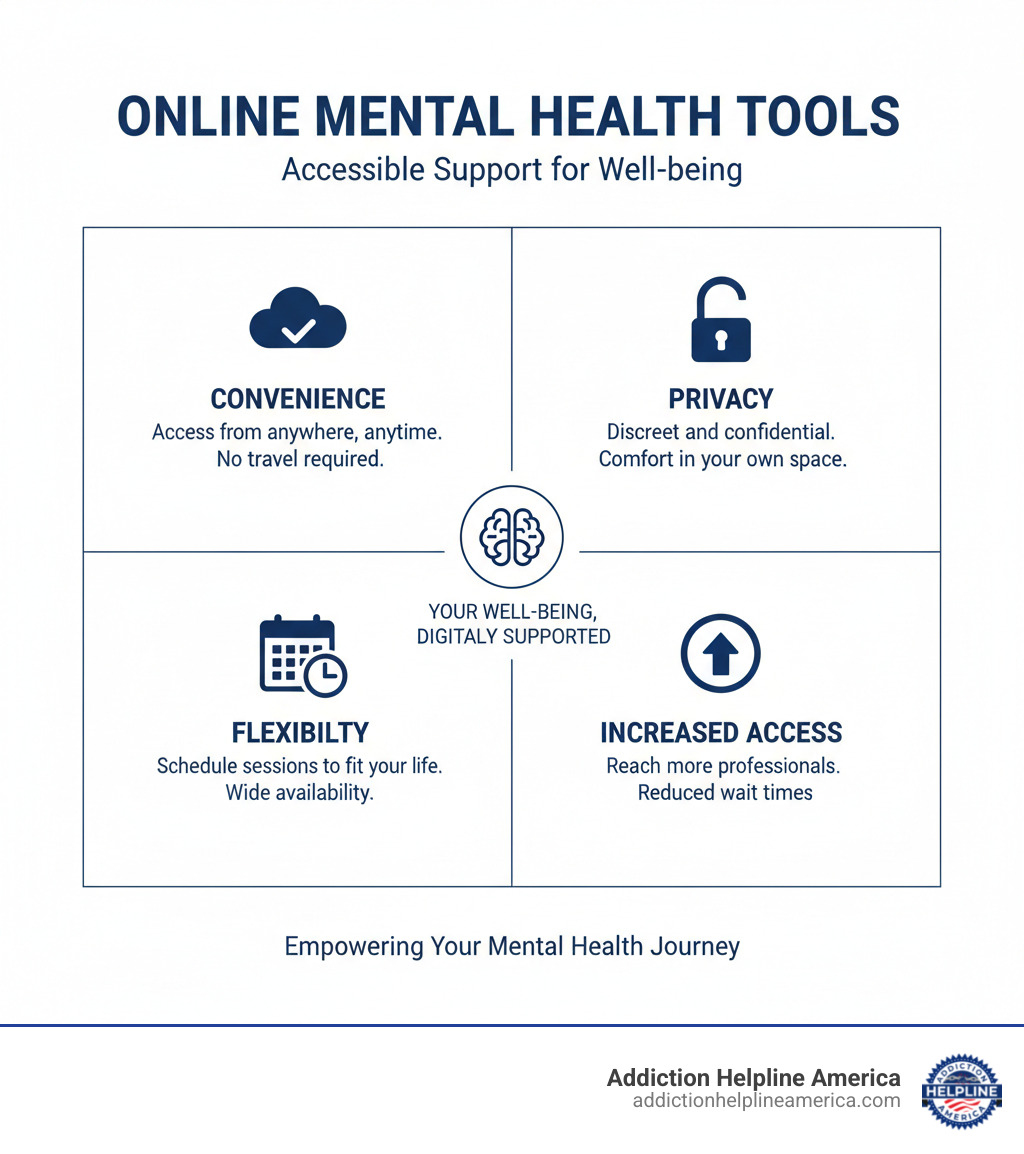
Way 6: Find the Right Type of Professional for You
Understanding the different types of mental health professionals helps you find the right match for your needs. Each brings unique training and skills to provide effective mental health services.
Types of Providers
Psychiatrists are medical doctors (MDs) who specialize in mental health. They can diagnose conditions and are uniquely able to prescribe medication. They are a good starting point if medication may be part of your treatment.
Psychologists hold a master’s or doctorate degree and are experts in psychological testing, assessment, and providing psychotherapy (talk therapy).
Psychotherapists or counseling therapists are trained to help you steer relationships, personal growth, and emotional distress through various therapeutic techniques.
Social workers provide counseling and are also skilled at helping you connect with community resources, government services, and benefits.
Occupational therapists (OTs) help you rebuild practical daily living skills that may have been impacted by mental illness, promoting independence.
Peer supporters are individuals with lived experience of mental health challenges. They offer emotional support, practical advice, and a powerful sense of connection, reminding you that recovery is possible.
Choosing the right professional depends on your current needs. If you need medication, see a psychiatrist. For talk therapy, a psychologist or therapist is a great choice. For practical life help, consider a social worker or OT.
At Addiction Helpline America, we can help you sort through these options. Explore our Treatment Options page or learn more about different forms of Therapy to find what resonates with you.
Way 7: Evaluate Intensive Options like Inpatient Treatment
When outpatient care isn’t enough and symptoms become overwhelming, intensive inpatient treatment can be the most effective path to recovery.
When to Consider Intensive Care: This level of care may be necessary if daily functioning is nearly impossible, there is a risk of harm to self or others, or other treatments haven’t worked. Inpatient programs provide a safe, structured environment with 24/7 supervision, allowing you to focus entirely on healing. Our Depression Treatment Centers Inpatient Guide can help you decide if this is the right step.
Dual Diagnosis: Co-occurring Substance Use and Mental Health Disorders: About half of people with a substance use disorder also have a co-occurring mental illness. This is known as a dual diagnosis. Addiction and mental health challenges are often intertwined, and one can worsen the other.
It is crucial to find a facility that offers integrated treatment for both conditions simultaneously. This coordinated approach addresses the whole picture, leading to more sustainable recovery. When searching, look for centers that specialize in co-occurring disorders. Our Treatment Options: Dual Diagnosis Treatment Facility page can guide you to the right programs.
Intensive mental health services exist because recovery sometimes requires more support than we can manage alone. These programs represent a place where healing can truly begin.
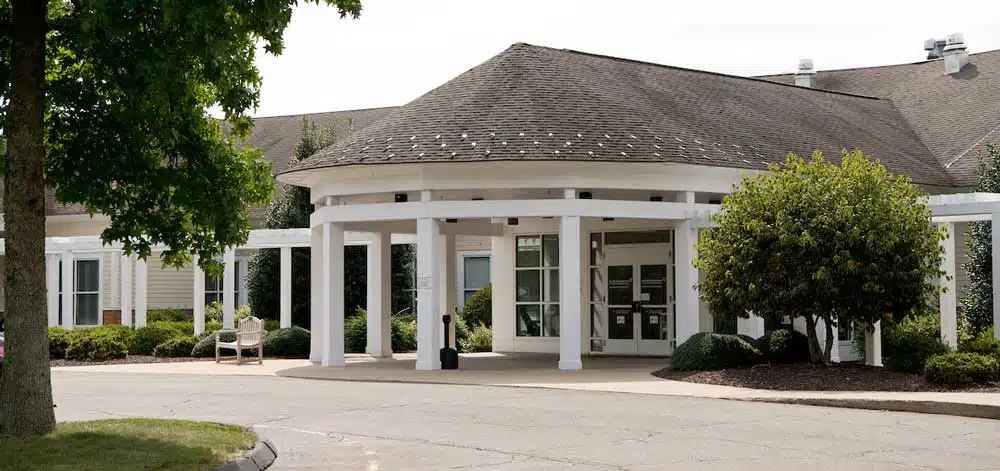
How to Support Someone Through a Mental Health Crisis
When a loved one is in crisis, your compassionate presence can be life-changing. You don’t need to be a professional to make a difference.
1. Ask Directly. If you’ve noticed changes, start a conversation. “I’ve noticed you haven’t been yourself lately, and I’m worried. What’s going on?” If you’re concerned about suicide, ask directly: “Are you thinking about suicide?” This opens the door for an honest, and often relieving, conversation.
2. Listen Without Judgment. Your main role is to be present and listen. Avoid giving advice or using platitudes like “just think positive.” Instead, validate their feelings by saying things like, “I’m here for you.” Let them know they are not alone.
3. Encourage Professional Help. Offer practical support in connecting with mental health services. You can help them search for providers, make calls, or drive them to an appointment. If they are resistant, keep the conversation open and share resources like the 988 Lifeline or Addiction Helpline America.
Know When to Call for Emergency Help. If your loved one is in immediate danger of harming themselves or others, call 911. For a suicidal crisis without immediate physical danger, call or text 988. Take any mention of suicide seriously. Stay with them and remove any means of self-harm if it’s safe to do so.
Supporting someone through a crisis is draining, so remember to care for your own well-being too. For more guidance, visit our Be There for someone page.
Frequently Asked Questions About Finding Care
You’re not alone if you feel confused or overwhelmed when trying to access mental health services. Many people share the same questions and concerns. Here’s what you need to know about the most common challenges and how to address them.
What are the biggest challenges in accessing mental health services?
Several barriers can make finding help difficult:
- Cost: High costs of therapy and medication, even with insurance, are a major obstacle.
- Wait Times: Long waiting lists for affordable services can delay crucial care.
- Stigma: Fear of judgment from family, friends, or employers prevents many from seeking help.
- System Complexity: Navigating different providers, insurance rules, and referral pathways is confusing.
- Finding the Right Fit: It can take time and patience to find a provider who understands your specific needs.
Fortunately, the rise of digital health tools like online therapy and apps is making care more accessible and affordable, helping to lower some of these barriers.
How can I provide feedback or make a complaint about a service?
Your voice matters. Whether you had a positive experience or encountered problems, sharing your feedback helps improve mental health services for everyone who comes after you.
Start by contacting the organization’s patient relations department. You can also seek help from a patient advocate (in hospitals), an ombudsman (for public agencies), or the organization’s accreditation body. Don’t stay silent if something isn’t right.
Are online mental health services effective?
Yes, for many people, online services are highly effective. Research shows that virtual therapy can be just as effective as in-person sessions for conditions like anxiety and depression. Guided self-help programs based on Cognitive Behavioral Therapy (CBT) also deliver real results.
Online care offers significant benefits in accessibility and privacy, removing barriers like travel and scheduling. However, it is not always the right fit. For severe mental illness, acute suicidal thoughts, or complex disorders, the structure and safety of in-person care, such as an intensive outpatient or inpatient program, is often necessary.
At Addiction Helpline America, we help people find the right type of care for their specific situation—whether that’s online support, local mental health services, or intensive treatment programs. Our goal is to connect you with what will actually work for you.
Call Now – Your Journey to Recovery Begins Today!

Take the first step towards a healthier life! Call now to connect with our compassionate team and start your recovery journey today. Your path to healing awaits!
Our recovery specialists are available 24/7 to provide support, and all calls are confidential and free. Reach out anytime – we’re here to help!
Conclusion: Your Path to Wellness Starts Here
You now have seven clear pathways to find mental health services, from crisis lines and local resources to specialized and intensive care.
The most important part is taking that first step. It doesn’t have to be perfect—it just has to happen. Whether it’s making a call or simply admitting you need support, that single action is everything.
Help is available, and recovery is possible. We’ve seen thousands of people who felt hopeless find their way to wellness. Your story doesn’t have to end where you are today.
At Addiction Helpline America, we make this journey easier. We offer free, confidential, and personalized guidance to connect you with effective mental health services and addiction treatment programs. Our specialists are here to guide you with patience and zero judgment.
You deserve support, wellness, and hope. Let us help you Find the right recovery program for you.
Our helpline is 100%
free & confidential
If you or someone you care about is struggling with drug or alcohol addiction, we can help you explore your recovery options. Don’t face this challenge alone—seek support from us.
Programs
Resources
Will my insurance
cover addiction
treatment?
We're ready to help
Find the best
drug or alcohol treatment
center
Are you or a loved one struggling with addiction? Call today to speak to a treatment expert.




